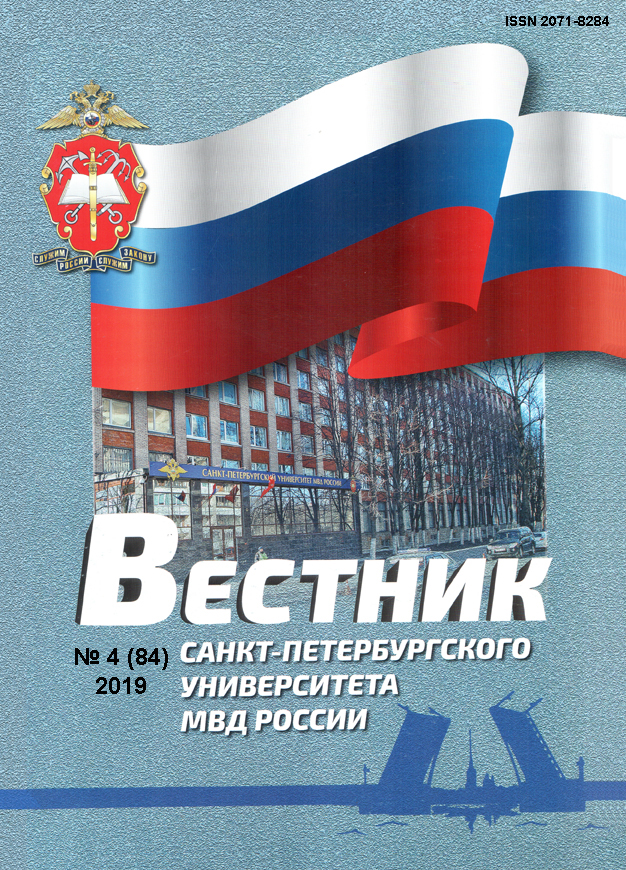Russian Federation
Russian Federation
UDC 15
CSCSTI 15.01
The article outlines that in the pre-revolutionary period positive experience of labor activitywas accumulated for staff in the area of religious and moral support of convicted women with children in custody by distributing and reading books of moral and religious content, via interviews with ministers of church, teaching women and their children to read, write, craft, by establishing orphanages, both at prisons and outside of them. In the post-revolutionary period in Russia until the 60s of the 20th century, the main focus was kept on solving sanitary-hygienic and material-ware support issues during the detention of convicted women with children. The late 50s and early 60s of the XX century’s a historical period when on the one handimprisonment conditions of punishment for convicted women with children were improved, and on the other hand – formation of a special labor activity of the personnel of penitentiary system and development of approaches to psychological and pedagogical support this category of convicts began. In modern conditions of penitentiary system research by V. S. Mukhina can be considered as the program document on the organization and carrying out as a special labor activity by the personnel of psychological support of the condemned women with children held in children’s homes at correctional institutions. It contributed to the fact that since 2002, the Department of psychological services of the Central Directorate of Corrections ofthe Ministry of Justice of the Russian Federation began to develop a «Program of rehabilitation of mothers and children in prison».
special labor activity of personnel, psychological support, female convicts with children in prison, post-revolutionary period, experiment, rehabilitation, children’s home
1. Voloshin D. V. Professional'naya podgotovka v shkolah GULAG NKVD SSSR v Velikuyu Otechestvennuyu voynu // Izvestiya Saratovskogo universiteta. - 2014. - T. 14. - № 2. - S. 94-99.
2. Debol'skiy M. G. Normativno-pravovoe obespechenie deyatel'nosti psihologicheskoy sluzhby ugolovno-ispolnitel'noy sistemy na razlichnyh etapah ee razvitiya // Ugolovno-ispolnitel'noe pravo. - 2018. - T. 13. - № 1. - S. 70-74.
3. Kalashnikova T. V., Kalashnikova M. M. Istoricheskiy opyt pedagogicheskogo soprovozhdeniya nesovershennoletnih osuzhdennyh v Rossii // Vestnik Kuzbasskogo instituta. - 2016. - № 3 (28). - S. 158-165.
4. Kalashnikova T. V., Kalashnikova M. M. Teoreticheskie podhody k organizacii psihologicheskogo soprovozhdeniya nesovershennoletnih osuzhdennyh / Ugolovno-ispolnitel'naya politika i voprosy ispolneniya ugolovnyh nakazaniy : sbornik materialov Mezhdunar. nauch.-prakt. konferencii (g. Ryazan', 24-25 noyabrya 2016 g.) : v 2 t. - Ryazan' : Akademiya FSIN Rossii, 2016. - S. 810-814.
5. Kirillova I. A. O celesoobraznom sroke soderzhaniya detey osuzhdennyh zhenschin v domah rebenka pri ispravitel'no-trudovyh koloniyah // Trudy VNII MVD SSSR. - 1969. - № 14. - S. 112-119.
6. Latysheva L. A. Osobennosti soderzhaniya i resocializacii zhenschin, imeyuschih maloletnih detey, v penitenciarnyh uchrezhdeniyah zarubezhnyh stran // Penitenciarnaya nauka. - 2018. - № 1.- S. 69−75.
7. Muhina V. S. Problema materinstva i mental'nosti zhenschin v mestah lisheniya svobody // Razvitie lichnosti. - 2003. - № 1. - S. 141-154.
8. Muhina V. S. Problema materinstva i mental'nosti zhenschin v mestah lisheniya svobody // Razvitie lichnosti. - 2003. - № 2. - S. 120-130.
9. Muhina V. S. Problema materinstva i mental'nosti zhenschin v mestah lisheniya svobody // Prestuplenie i nakazanie. - 2004. - № 1. - S. 25−27.
10. Omel'chenko O. A. Istoriko-pravovoy analiz regulirovaniya problemy otbyvaniya nakazaniya v vide lisheniya svobody beremennymi zhenschinami i zhenschinami s maloletnimi det'mi // Rossiyskiy zhurnal pravovyh issledovaniy. - 2014. - № 4 (1). - S. 198−205.














